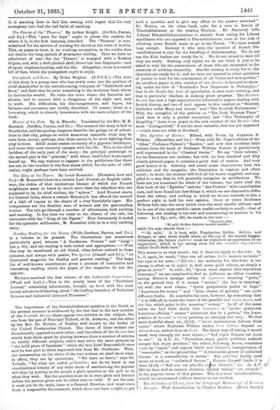The importance of the Disestablishment question in the North at
the present moment is evidenced by the fact that in the new number of the Scottish Review there appear two articles on the subject, the one from the pen of Principal Talloch, of St. Andrews, and the other by the Rev. Dr. Hutton, of Paisley, well known as the leader of the United Presbyterian Church. The views of these writers are diametrically opposed to each other; and the editor of the Review has wisely kept them apart by placing between them a number of articles on totally different subjects, which may serve the same purpose as "the solid piece of farniture" which the late Lord Beaconsfield once said be was glad to think separated him from Mr. Gladstone. With- out commenting on the views of the two writers, we shall show what, in effect, they are by quotations. "We have no fancy," says Dr. Tolloch, "for what are called plebiscites ; nor do we know in our constitutional history of any other mode of ascertaining the popular will than by putting to the people a plain question at the poll as to what they wish. But the question must be at once plain and distinct before the answer given can be either tree or valid. If not the sole, it must yet be the main, issue at a General Election, and must come from a responsible Government, which alone can have a right to put
such a question and to give any effect to the answer returned." Dr. Hatton, on the other hand, calls for a vote in favour of Disestablishment at the coming Election. He distinctly tells Liberal Disestablishmentarians to abstain from voting for Liberal
candidates who are opposed to Disestablishment, even at the risk of allowing some Scotch seats to go to the Tories. "We have waited long enough. Gainsay it who may, the question of Scotch Dis- establishment is ripe for the handling of statesmanship. We do not say the Kirk leaders are ready for it. We do not intend to wait till they are ready. Seeking only rights, we do not think it just to be asked to wait for the convenience of those who are interested in the retention of existing inequality. But the country is ready for it; the churches are ready for it ; and we have not learned in other questions of justice to wait for the convenience of all Tories and monopolists." An excellent paper in this number of the Review is devoted to show- ing, under the title of "Scotland's New Departure in Philosophy," that in the North the love of speculation is once more reviving, and that in particular idealism is making great progress. The Scottish Review has now a high reputation for informative papers dealing with Scotch history, and two of such appear in this number on "Scottish Catholics under Mary and James" and "The Scottish Parliaments.' With the exception of the articles on "The York Mystery Playa" (and that is only a partial exception) and "The Philosophy of Stupidity," there is no paper in the new number of the Review—the most "distinguished," if not the most valuable, that has yet appeared —which does not refer to Scotland.






































 Previous page
Previous page